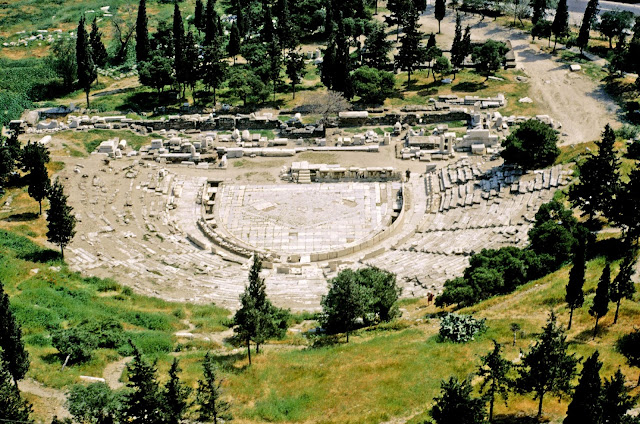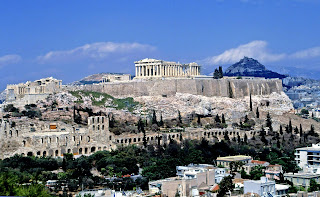 |
| The Acropolis, Athens, Greece |
Departure time from Hotel: 4.15am Flight no. RJ191 Flight deps. 6.45am
We are supposed to clock
in at the airport at 4.30am and our tickets should arrive on a flight from
Athens! ALIA (Royal Jordanian Airlines) flight RJ191 is scheduled to leave for
Dubai and Amman at 6.45am. In Amman we change planes for the connecting flight
to Athens. According to the timetable, we are due in Athens at 1.30pm and will
be met there and taken to our hotel by a driver under contract to Sundowners.
We will be staying at the Hotel Florida, or another nearby hotel until our
flight to Cairo on Monday. This evening and tomorrow will be free time in
Athens. The hotel is central – near Omonia Square, the smaller of the two main
squares in the city. The other is Constitution (or Syntagma) Square where the
former Palace, American Express, Tourist Office, Airline offices are found. The
Plaka area of Athens is also within easy distance. This is the old area of
Athens where much of the night life is found, as are the cheaper eating places.
The Acropolis (also a ‘sound and light’, every night) with the Parthenon, the
Erechtheum, and other buildings can be reached on foot, as can the Temple of
Olympian Zeus and the Athens Archaeological Museum with its fine collection of
Greek sculpture. You will have no problem filling in the next couple of days
until our flight to Egypt.
 |
| The Acropolis from the Agora, Athens |
Day 35 Sun 29 June ATHENS
A free morning to look around the Greek capital, visit the Acropolis and the Parthenon (free on Sundays) and the nearby Agora and Pnyx with their ancient crop of ruins. The Agora was the ancient market area of Athens.
Athens is among the world's continuously occupied cities with a recorded history going back over 3,400 years. Classical Athens was a powerful city-state, often in conflict with neighbouring Sparta, Thebes and with the invading Persians and it is widely referred to as the 'cradle of Western civilisation and the birthplace of democracy'. According the an ancient Athenian myth, Athena, Greek goddess of wisdom competed with Poseidon, god of the seas for the patronage of the as yet unnamed city. Cecrops, king of the area, was to be judge and it was agreed whoever gave the better gift would have the city named after the winner. Poseidon struck the ground with his trident and a salt-water spring appeared (another version says he gave the inhabitants the first horse), but Athena offered the first olive tree which was accepted and Athena became the patron of the city.
 |
| Ruins of Mycenae, of which Athens was an important centre by 1400 BC |
By 1400 BC, Athens had become an important centre of the Mycenaean civilisation and a fortress had been established on the Acropolis. By the 6th century BC, widespread social unrest had led to reforms which paved the way for the introduction of democracy by Cleisthenes in 508 BC. By this time Athens was a significant naval power and had supported the rebellion of the Greek Ionian cities in Asia Minor against Persian rule. This in turn led to the Greco-Persian Wars where a coalition of Greek states, led by Athens and Sparta eventually repelled the Persians, defeating them decisively at Marathon in 490 BC and in the naval battle of Salamis in 480 BC. This, however, had not stopped the Persians from capturing and sacking Athens twice during the wars. The following decades became known as the 'Golden Age of Athenian Democracy, and guided by Pericles, embarked on an ambitious building programme which saw the construction of the Parthenon and other buildings on the Acropolis
 |
| Columns of the Parthenon with Erechtheum at back. Taken in 1970 when access to the Parthenon was still possible |
In 338 BC an alliance of Athens and Thebes was defeated by Philip II of Macedon (Alexander the Great's father) at the Battle of Chaeronea. In 146 BC Greece and Athens were occupied by Rome and Athens was given the status of a free city because of its 'widely admired' schools.
 |
| Detail of the Elgin Marbles, British Museum formerly on the Parthenon |
There was another period of building under the Emperor Hadrian in the 2nd century AD which saw the completion of the Temple of Olympian Zeus. After the fall of Rome, Athens was sacked by the Visigoths and Slavs, although at this time Christian churches were established, including one in the Parthenon. In the Middle Byzantine period the city expanded and was relatively prosperous during the Crisades, but the city, and Greece, were conquered by the Ottoman Turks in 1458 and a period of decline set in. Following the Greek War of Independence (1821-29), a Greek Kingdom was established and in 1834 Athens became the capital of newly independent Greece.
 |
| Temple of Olympian Zeus, Athens |
The Temple of Olympian Zeus, Lord of the Thunderbolt and King of the Gods, is worth a visit. Nearby is the ancient Hadrian’s Arch, built for the Roman emperor whose name crops up from one end of the Roman Empire to the other (e.g. Hadrian’s Wall in the north of England). This arch separated the old city of Athens from the city of Theseus. One of the main attractions to see in Athens are the antics of the Evzones, or Presidential Guards. These guards can be seen at the Tomb of Unknown Soldier outside the Greek parliament building in Syntagma Square and also outside the Presidential palace. Every 15 minutes these motionless guards will change position and a changing of the guards takes place every hour. This is always a great photo opportunity.
 |
| The Evzones or Presidential Palace guards, Athens |
This afternoon George, our Greek driver, has kindly consented to run us down the coast, 50 odd kilometres, to the beach at Cape Sounion.
 |
| Temple of Poseidon Cape Sounion |
Day 36 Mon 30 June ATHENS – CAIRO
A free morning in
Athens while I pick up our tickets to Egypt for this afternoon’s flight to
Cairo. We will leave the hotel at 1pm for the airport. Flight is scheduled to
leave at 4.30pm, but it could be late (not uncommon for TWA - 'Try Walking Anyway').
 |
| The Theatre of Dionysus from the Acropolis |
In
Cairo we will be met by a local representative who will act as courier for the
duration of our stay in Egypt. He will inform us of the actual itinerary of the Egyptian
sector. It will be after dark by the time we settle into the Hotel Fontana,
Ramses III Square, Cairo.
 |
| The River Nile in Cairo, Egypt |
text & photographs ©Neil Rawlins |



ReplyDeleteI appreciate this well-informed blog. Thank you so much for all the insights, please keep posting and sharing more articles like this.
Travel Guide
Thank you, still have quite a few posts to go on the Overland journey - they were great days in the 70s & 80s.
ReplyDelete